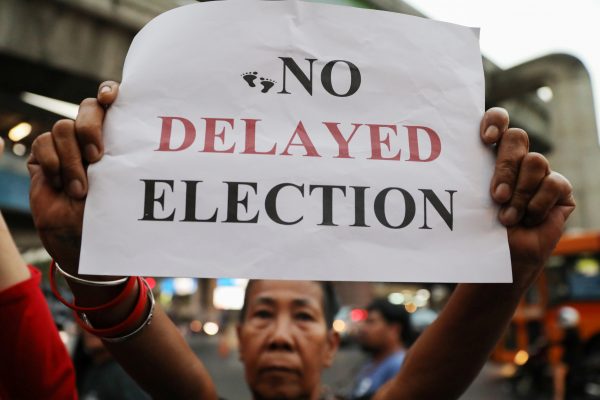Two days later, an acute observer of Thai politics, Prajak Kongkirati tweeted, ‘After the earthquake, beware the strong aftershocks’. What are the repercussions of recent events likely to be for Thailand’s elections scheduled for 24 March?
The first week of February was a more joyful week in Thai politics than has been witnessed for some time. Although the Electoral Commission restricted the scope for parades and festivities, registration of parliamentary candidates — including 45 parties nominating 69 party list candidates for prime minister — was conducted with enthusiasm. Media and political analysts reported on election-related developments with great interest. The Thai people’s appetite for democratic process was obvious and undiminished. Then the bombshell.
Details are now emerging of how it came to pass that Thai Raksa Chart, a Thai political party affiliated with the exiled billionaire and former prime minister Thaksin Shinawatra, nominated Princess Ubolratana as a prime ministerial candidate. It appears that the two developed a plan without the consent of the reigning monarch — a massive misjudgement. Less than 12 hours after the Princess’ nomination, the palace vetoed the nomination, calling it ‘tantamount to breaching time-honoured royal traditions, customs and national culture’.
How will this impact the election? Much is still to play out, but there are reasons to think that both sides of politics may see it in their best interests to act with restraint. One of the beneficiaries of what has occurred is without doubt Prime Minister General Prayut Chan-o-cha. His nomination as a prime ministerial candidate by the Phalang Pracharat Party would have been the news story of the week were it not for the spectacular flameout of the royal nomination.
Prayut’s path to becoming an elected prime minister remains favourable. If he can cobble together 126 seats from a coalition of his own and other smaller parties, and command virtually all of the 250-member Senate (as is expected given senators are appointed by the junta), he will have a total of 376 seats. Under the 2017 Constitution this is the majority across both houses required to secure the prime ministership.
General Prayut could be tempted to delay or cancel the election in light of what has occurred. But this could trigger unrest and exacerbate an already volatile situation. Emotions are running high on all sides of politics. Plus the election must be complete and the new government bedded down before the royal coronations scheduled for 4–6 May.
More likely is a series of legal processes that began with the Electoral Commission formally ruling out the nomination of Ubolratana. The Commission may now potentially refer Thai Raksa Chart to the Constitutional Court for breaches of the constitution. This could in turn see the party dissolved.
Will General Prayut leverage Ubolratana’s aborted entry into electoral politics as a line of attack against the Thaksin-affiliated parties while campaigning? Potentially, but this seems unlikely because there will already be serious concern about the damage done to the standing of the monarchical institution.
What is possible is that the election will continue as before, stabilising as some of the more staple issues of elections like air quality and economic management return to the fore. This is ground on which Pheu Thai, the main Thaksin-affiliated party, can still compete — assuming it can insulate itself from the Thai Raksa Chart dissolution fallout.
Will supporters of the Thaksin clan desert Pheu Thai in disgust at his impulsive machinations? Perhaps, but there are a number of factors at play here. One is that Thailand is currently gripped by an identity politics not dissimilar to the Trump-Republican phenomenon in the United States. In this setting, the misdeeds of a leader are insufficient to shift close identification with what that figure stands for: opposition to the ‘establishment’. Some may still see voting for Pheu Thai as the best way to remove the military from power.
Pheu Thai might still be able to acquire, with continued strong support in the north and northeast of Thailand, somewhere close to 250 seats in the lower house. This would mean it would still be a powerful opposition in Thai politics, potentially with the capacity to bring down a Prayut government in a vote of no confidence.
Another question is how the Pheu Thai leadership will react to Thaksin’s latest blunder. Thaksin’s lack of political antennae should be obvious to all by now. His decision to make an enormous profit on the sale of his telecommunications company Shincorp in 2005 without paying any tax fostered the grassroots campaign that led to his political demise in 2006. And his insistence in 2013 that his sister Yingluck pursue an amnesty bill that would have allowed his return to the country contributed to the end of her government in 2014.
But it seems difficult for Thaksin’s lieutenants to desert. They lack the brand, the initiative and the bank balance to break away. They also believe, with some justification, that they are unfairly targeted by the military and judiciary.
In theory and in the longer term, the emerging Future Forward Party should be able to challenge the continued military dominance of Thai politics and move into the space of clean, populist policy focussed on economic growth. In practice, it appears that for the time being Future Forward lacks the profile, grassroots campaign machinery and leader to win enough votes outside of Bangkok.
Greg Raymond is a Research Fellow in the Strategic and Defence Studies Centre at the Australian National University and the author of Thai Military Power: A Culture of Strategic Accommodation (NIAS Press, 2018). You can follow him on Twitter at @GregoryVRaymond.

